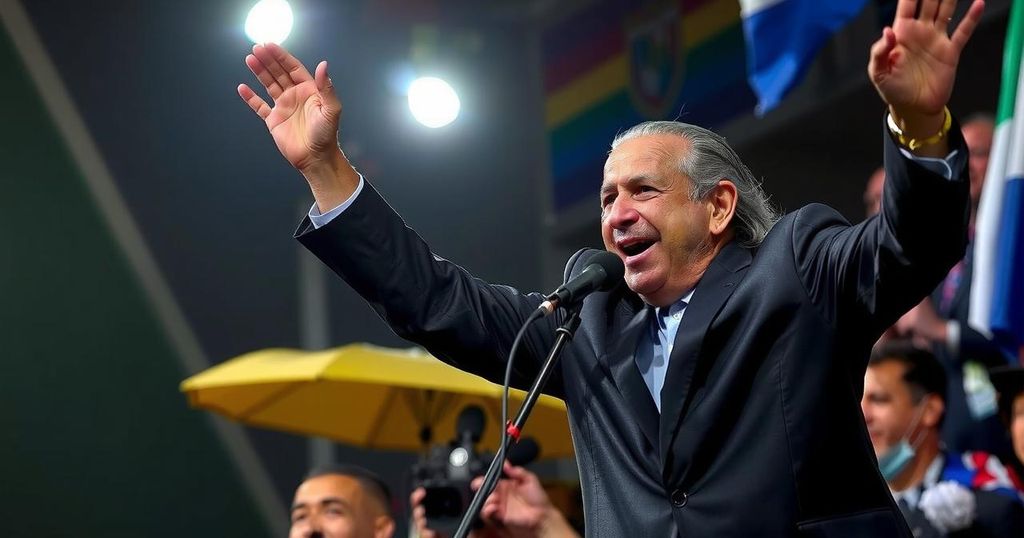Yamandú Orsi Elected President of Uruguay, Signaling Shift in Governance

Yamandú Orsi of the Frente Amplio alliance has been elected President of Uruguay, indicating a shift back to left-wing governance after five years of conservative rule. His commitment to national dialogue and addressing crime and economic growth resonates with many voters. With a notable victory margin over Álvaro Delgado, Orsi’s administration is expected to navigate ongoing socio-political challenges while managing public expectations for reform.
Yamandú Orsi of the left-wing Frente Amplio alliance has been elected President of Uruguay, as official results confirmed on November 24. This election reflects a shift in voter sentiment following five years of conservative governance under President Luis Lacalle Pou. Orsi’s victory speech emphasized his commitment to national dialogue, while his opponent, Álvaro Delgado of the National Party, concedes with grace, signaling a peaceful transition of power.
The election outcome indicates a new direction for Uruguay, though analysts suggest that significant alterations to economic policy are unlikely. Both candidates recognized the necessity of addressing crime related to drug trafficking and fostering economic recovery from the Covid-19 pandemic’s impacts. With nearly all ballots counted, Orsi secured 1,123,420 votes against Delgado’s 1,042,001, according to the Electoral Court.
Celebrations erupted in Montevideo, where Orsi garners substantial support. His campaign was notably strengthened by endorsements from former president José Mujica, whose legacy includes significant social reforms during his administration from 2010 to 2015. Orsi previously achieved 43.9% of the votes in the October 27 first round, surpassing Delgado’s 26.7% in the face of a ban on consecutive terms for the outgoing president, now enjoying a high approval rating.
As Uruguay prepares for Orsi’s leadership, he will navigate with a Senate majority from the Frente Amplio, even though his coalition holds a minority position in the Chamber of Representatives. The electorate remains concerned about crime, reflecting the broader challenges faced during the preceding conservative rule that followed 15 years of leftist governance, which ended in 2020 amid public discontent over rising insecurity linked to drug trafficking.
Historically, Uruguay has made significant progress under leftist administrations, including the legalization of abortion, same-sex marriage, public smoking bans, and recreational cannabis use. With compulsory voting in Uruguay, a nation recognized for its political stability, the upcoming climate under Orsi’s administration is eagerly anticipated as he takes the helm in an evolving socio-political landscape.
The recent election in Uruguay marks a critical turning point, as Yamandú Orsi from the leftist Frente Amplio coalition has come to power, reversing five years of center-right governance. Historically, the Frente Amplio dominated Uruguayan politics for 15 years until 2020, when public discontent over crime concerns led to the election of a conservative government. This transition reflects the ongoing challenges related to drug-related crime, economic recovery, and social reforms that have characterized Uruguayan politics in recent years. The significance of this election extends beyond the immediate political landscape; it encompasses a broader narrative of Uruguay’s efforts in addressing socio-economic inequalities while navigating a turbulent global climate. Notably, Uruguay has been recognized for its progressive social policies, and the return to left-wing rule raises expectations for a renewed focus on such reforms amidst pressing security concerns.
In conclusion, the election of Yamandú Orsi represents a decisive shift in Uruguay’s political landscape, ushering in a left-wing government after five years of center-right leadership. The electorate’s decision underscores the enduring concerns over crime and economic recovery, despite the relatively minimal expectations for drastic policy changes. As Orsi prepares to lead, the dynamics of governance in Uruguay highlight the intricate balance between addressing public concerns and advancing past social reforms.
Original Source: www.lemonde.fr








